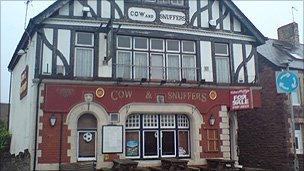Last orders for struggling Welsh pubs
- Published

The Cow and Snuffers in Cardiff recently closed after nearly 200 years
A few years ago, Rhondda landlord Colin Davies was one of about 30 members of his local pub association.
Now he says they are lucky to have seven.
That number is likely to continue to dwindle after two more pubs in his Valleys community of Tonypandy closed.
They were being sold at auction on Wednesday, along with 11 other pubs from around south-east Wales, including the historic Cow and Snuffers pub and The Neville in Cardiff.
It reveals the "sorry state" of the pub industry for Mr Davies, who has run his pub, The Clydach Vale Hotel, for more than 20 years.
"It's terrible and these are sad times for everyone," he said.
"In my opinion, it all comes from the smoking ban [introduced in Wales in 2007]. We really noticed a huge difference. Our customers just stopped coming.
"People in the valleys don't want a gastro pub - they want somewhere they can come and have a drink, a smoke and chat.
"I'm lucky - I've just finished paying off my pub's mortgage. If I hadn't, I think we'd be closed now. Two more pubs have closed here and I know of others that are struggling.
"Once these pubs are gone, they usually just become derelict and it affects everyone. People who have been meeting for years have to stay at home and for many, particularly older people, it becomes very lonely."
Pubs demolished
It is not just a problem in the Valleys. According to the British Beer and Pub Association, 156 pubs closed across Wales in 2009 alone.
Licensed property specialists Sidney Phillips currently has around 120 freehold pubs for sale in Wales, ranging from rural watering holes to city establishments.
Its latest auction included the De Winton and Ivor Hael pubs in Tonypandy, the New Broden in Porthcawl, the Blaenogwr in Nantymoel, Bridgend county, Raffles in Pontypridd and the Cow and Snuffers in Cardiff, which dates back to 1812.
Only five were bought in the auction but a Sidney Phillips spokeswoman said the others would now be sold privately and a few already had offers.
Iain Loe, research and information manager at the Campaign for Real Ale (Camra), said the worry was that many of the pubs being sold would not be re-opened again.
"We're very sad when these pubs are sold as they're often not bought by someone who wants to carry on running them as pubs," he said.
"In rural areas some pubs are turned into holiday homes and, in more urban areas, they could be turned into flats or other community facilities where they don't need to change the planning consent.
"Of course, lots of pubs have big car parks and, as long as the pub isn't a listed building, a developer could buy it, knock it down and build lots of houses on the plot instead. There's no protection against that."
He said a "combination of several factors" had led to the decline of the pub industry across the UK, including the fact that more people are not going out during the current economic downturn and, instead, buying cheap alcohol in supermarkets.
He said the smoking ban had led to the more traditional punters staying at home, while high business rates, rents and overheads and the increase in excise duty were crippling many landlords.
"Some pubs are diversifying to survive," said Mr Loe.
"Lots do food and other ideas include integrating the local shop or post office in the pub in rural areas. The post office has also started a service where people's parcels can be dropped off at their local pub if they're not at home.
"Some pubs cook meals for local schools and there's also the idea of offering discount lunchtime meals for OAPs and taking on services like meals-on-wheels."
One such pub which is trying to diversify to ensure it is successful is the Creigiau Inn in Creigiau near Cardiff.
Landlady Abi Osborne and her husband took over the pub three years ago.
"We decided to take it on as it's my village pub and I was convinced we could turn it around and make it work," she said.
Coffee machine
"We cleaned it up and started doing good pub food. We have extended the hours, we serve food and do offers, such as buying two meals and a bottle of wine for £20.
"We also have a quiz night and invested in a coffee machine so we now have regular groups that meet each week for coffee, including mums who often pop in before the school run. I think the smoking ban helps with things like that.
"We're getting there and you've got to be committed and in it for the long haul, with the right customers and staff. But it really is essential to diversify these days."
Elsewhere, The Raven Inn in Llanarmon yn Iâl, Mold, Flintshire, is also branching out, with a post office opening in the pub.
The community has run the inn since August 2009 and it is manned by volunteers, with any profit made being used to fund village community projects.
"The pub is a vital place for the whole community," added Mr Loe.
"The way pubs are closing at such a rapid rate, we're in danger of having communities without any local facilities, just a collection of houses. That would be awful for everyone."
- Published14 July 2010
- Published31 May 2010